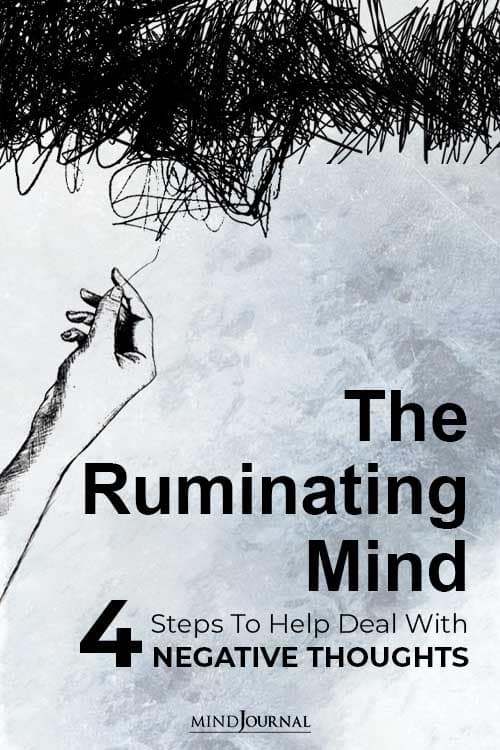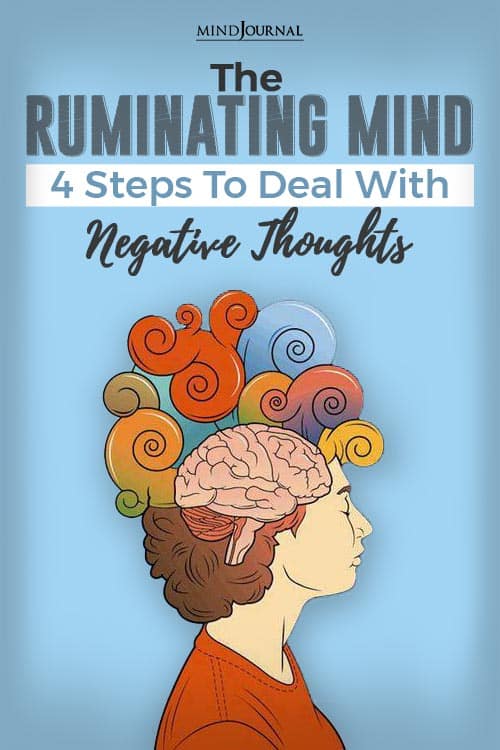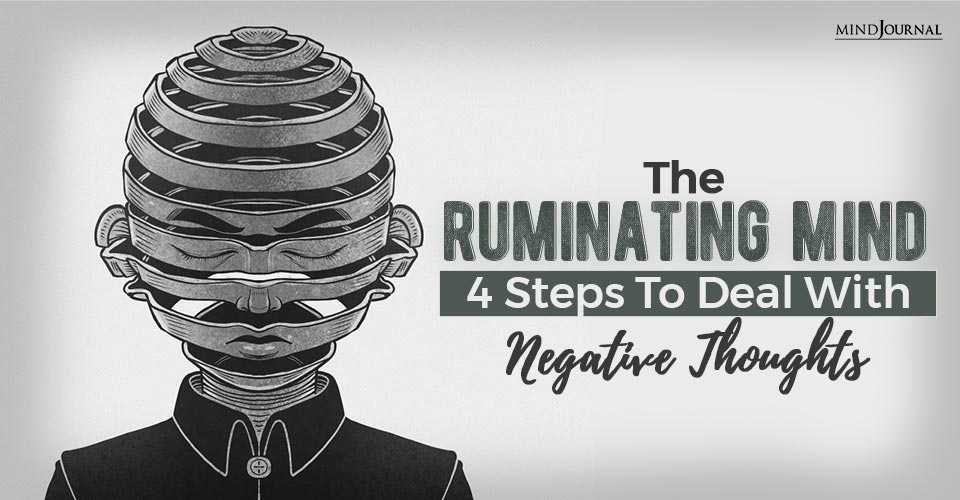Rumination often involves having recurrent negative thoughts or memories. Having a constant ruminating mind and negative thoughts can spell trouble for your mental health, and inherent peace of mind as such thoughts interfere with your daily life and can lead to depression.
Remember the time a friend did you wrong? A boss was unfair to you? Someone took something that belonged to you? You were abandoned or ignored? You encountered hard times? You were scared?
Yes, you remember these times, because your ruminating mind—that runs loops over and over again—probably won’t let you forget these incidents. It isn’t bad enough that you experienced whatever the negative trauma was in real-time, but rather than letting go and moving on by acknowledging it is over, your mind continues to hold on and review it time and time again.
Perhaps you focus on what you wish you had said—and you practice your presentation or pitch to your imaginary audience. Maybe you vow you will never let yourself be vulnerable or in that situation again, and you take mental steps to ensure that doesn’t happen. Maybe you secretly plot and plan how you will get back at someone and exact your revenge.
Whatever you plan and consider, chances are good, it is all happening inside of your head, and your mind is pulling you back to that place and event and refusing to let it go.
Many people relive traumas, such as cruelty in the form of emotional or physical abuse. The attacker may be long gone, even buried in the ground, but the raw experience of the abuse lingers. You can see their eyes, their facial expression, and remember exactly how it felt to be so vulnerable and afraid.
Many people who have lived through war or life-threatening events, such as car accidents or escaping from a deadly fire, have PTSD (post-traumatic stress disorder) continually dragging them back into the experience.
Related: A Psychologist Explains How You Can Rewire Your Brain To Get Rid Of Negative Thoughts
It’s as if the mind cannot get over the negative experience and needs to make you relive it time and time again to somehow find a way to heal it. The problem is, going back to the experience in your mind rarely fixes it; rather, it cements the experience and reminds you frequently of what you’ve lived through.
If your condition is as serious as PTSD, or you are ruminating in a manner where you believe you could harm yourself or someone else, seek professional medical help right away. This article is not meant to cure a deep psychological disorder.
However, if your situation is not as grave, but it is irritating and hampering your ability to enjoy a full and happy life, and you are living in a negative place inside your head, consider taking some steps to help yourself function differently:
Here Are 4 Steps That Can Help You Deal With Your Ruminating Mind
1. Remember that images in your mind, or words you tell yourself, or stories you makeup or come to believe, are all just that – images and stories your mind has made up.
Yes, you experienced the event, but the event is no longer real—your mind just continues to relive it. This is often called negative self-talk. It’s where you focus on something past or in the future and don’t allow yourself to be objective and data-centric about what is happening in the now.
The event is gone. It was tough, it hurt you, it was scary and upsetting, but you lived through it. When your mind tries to revisit it and drag you back, remember—it isn’t real anymore. Force yourself to focus on something outside of yourself. Become aware of your body, your environment, your facial expression, your surroundings.
The mind can’t focus on two things at once, so drag your mind back into the now and let the past experience recede into the background.
Related: 5 Tips To Help Get Rid Of Negative Thoughts
2. Journal your feelings and thoughts about what happened to you and why.
Pour your heart out. Take the time to write about what a fool you were, what you wish had happened instead. Get it all out on paper. Take time to be thorough and expressive. Cry, rant, and swear while you are doing it.
Then, once you are done—stand over the wastebasket and slowly and methodically rip that paper into teeny, tiny pieces. Watch it fall into the wastebasket as if you were at some sort of a ceremony. Then, wipe your hands and rub them clean of the event. It is gone. Put the waste into your trash, and say goodbye to it forever.
When it wants to return to your mind, picture those pieces of tiny paper being incinerated in some trash pile somewhere far, far away.
3. Talk to a friend – not about the sadness of the event, but about what you have learned from it and what you are willing and able to do differently in your life.
Find a buddy who cares about you and will listen to you as you explain a bit of background (assuming they do not know), and then share what steps you will take or are taking to improve, change, or enhance for the future. Be focused on what you are taking away that is positive and beneficial and not what dragged you down in the past.
Most of the best life lessons come from some negative experience, assuming that you learn from it and do something different next time.
Related: 11 Ways To Put An End To Overthinking
4. Help someone who has suffered through a similar situation – focus your attention outside of yourself.
Some of the best rape counselors are those who experienced the horror firsthand themselves. They are empathic and understanding because they’ve been there. Someone who has been cheated on, or robbed, or taken for granted, will benefit from the wisdom and support of someone who has lived through the same sort of thing.
There is comfort in knowing you’re not alone. When you give the gift of support to another, you actually gain a huge gift in return—the focus is on them, and your mind can’t spend its time ruminating over what’s happened to you.
The experience happened. You can’t change the course of history, but you can take charge of your ruminating mind and change your present, and your future.
Check out Beverly Flaxington’s best-selling book on Amazon.
Written By Beverly Flaxington
Originally Appeared In Psychology Today
The more you give in to negative thoughts and indulge in overthinking about the bad things that have happened to you in the past, the more disturbed you will feel. Giving your negative thoughts too much power can prove disastrous for you mentally, and psychologically.
Whenever you have trouble dealing with your ruminating mind, come back to these pointers as these can help you deal with your negative thinking in a much better and healthier way.












Leave a Reply